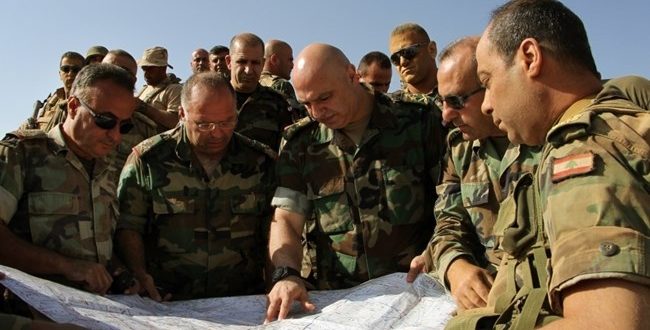The Lebanese Army had liberated two-thirds of Daesh- (ISIS) occupied territories on the outskirts of Ras Baalbeck and Al-Qaa by Sunday evening, killing 35 militants in the process as they seek to eradicate the last vestiges of militant threats to national security. Three Lebanese soldiers were killed and one critically wounded after their jeep hit a land mine on the outskirts of the border town of Arsal Sunday. President Michel Aoun visited the wounded serviceman and wished him a speedy recovery.
The Army identified the three soldiers as decorated Sgt. Bassem Moussa Moussa, born April 5, 1979, in Birqayel, Akkar; Pvt. Elie Ibrahim Freijeh, born Sept. 17, 1994 in Raeet, Zahle; and Pvt. Othman Mahmoud al-Chedid, born April 1, 1989, in Akkar. Moussa was married with two children. Chedid was married with one child.
The Army also foiled two suicide attacks that were on the verge of targeting units. The Army destroyed a car and motorbike as they sped toward Army positions, thwarting the attacks. Two further soldiers were wounded in Sunday’s fighting, bringing the total number for the Army to 13 wounded, two of whom are in critical condition. The Army has so far managed to liberate 80 square kilometers out of the 120 square kilometers of Lebanese territory that was occupied by Daesh.
In the weeks leading up to the offensive, the Army managed to secure 20 square kilometers as it was tightening the noose on the militants. Soldiers then captured 60 square kilometers over the weekend.
A total of 12 Daesh positions have been taken so far. The outposts were linked to a complex of tunnels, and had significant arms and ammunition caches. An Army spokesperson said the militants are abandoning their posts en masse with significant numbers fleeing the battlefield, although he did not disclose how they were leaving the area of operations and there has been no confirmation of militants surrendering to the Army.
The military had been pounding Daesh with artillery and missile strikes on an almost daily basis in the weeks leading up to the offensive.
Army commander Gen. Joseph Aoun announced the start of the offensive at 5:00 a.m. Saturday via Twitter. “In the name of Lebanon, the abducted soldiers and the blood of the martyrs, and in the name of the heroes of the great Lebanese Army, [we] declare the launch of the ‘Fajr al-Joroud Operation’ on the outskirts of the Ras Baalbeck and Al-Qaa [towns],” he said.
Gen. Aoun toured the area of operations to inspect units in the field as the battle progressed Sunday.
As soon as the announcement was made, Army units pounded Daesh outposts with artillery barrages and missiles accompanied by precision strikes carried out by Army helicopters.
Hours later President Michel Aoun made his way to the operations room and called the commander on the ground, saying, “We await victory. We know that you will not disappoint.”
Lebanese Red Cross Secretary-General George Kettaneh said that between 175 and 185 volunteer medics were deployed in the area and ready to provide assistance to the military should the need arise.
During a briefing at the Defense Ministry in Yarze, Military Spokesperson Brig. Gen. Ali Kanso set out the Army’s objective, saying it aims to “destroy Daesh and take back the land so that the Army will spread out all the way toward the Syrian border.”
Kanso specified that there was no time frame for the offensive, saying that the Army would continue to push forward and would achieve its stated objectives “no matter the costs.”
Another Army spokesperson, Col. Fadi Abou Eid, said Sunday that the military will be diverting reinforcements to the area in order to speed up the liberation process.
He said that land mines and improvised explosive devices had hindered the Army’s progress, adding that specialized engineering units had been sent to the field to locate and defuse any unexploded ordnance.
“The battle has no specific time period, we are committed to it until the destruction and expulsion of Daesh from Lebanese territories,” Abou Eid said during a briefing. “Minefields are delaying the Army’s advance and there are battalions from the Army’s Engineering Corps that are dedicated and are clearing the fields so that we may continue our advance.”
Defense Minister Yaacoub Sarraf received a phone call from his Iraqi counterpart, Irfan al-Hayali, who praised the operation against Daesh.
Hayali emphasized Iraq’s unique understanding of the Army’s battle, given the country’s struggle with Daesh and terrorism.
In a statement released by Sarraf’s office Saturday, Hayali offered the defense minister Iraq’s complete support to Lebanon and the Army, adding that Iraq stood beside Lebanon in this battle.
The Army posted a photo to its official Twitter account showing Lebanese soldiers carrying both the Lebanese and Spanish flags. “Salutations from our soldiers fighting Daesh on the outskirts of Ras Baalbeck to the victims of Spain and the world,” the tweet read. Two terror attacks struck Spain last Thursday, leaving 14 dead and over 120 wounded.
The Spanish Defense Ministry later thanked the Army’s gesture on Twitter. “Thank you so much for your support @LebarmyOfficial, we are very honored,” the Spanish Defense Ministry tweet said. “They will not defeat us or our way of life!”
 Lebanese Ministry of Information
Lebanese Ministry of Information



